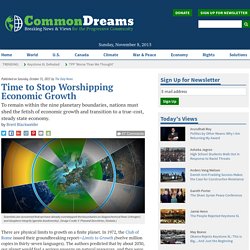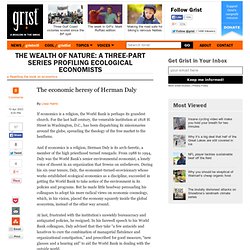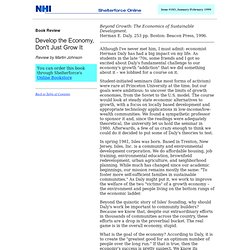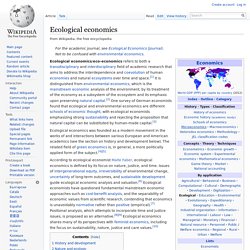

Time to Stop Worshipping Economic Growth. There are physical limits to growth on a finite planet.

In 1972, the Club of Rome issued their groundbreaking report—Limits to Growth (twelve million copies in thirty-seven languages). The authors predicted that by about 2030, our planet would feel a serious squeeze on natural resources, and they were right on target. In 2009, the Stockholm Resilience Center introduced the concept of planetary boundaries to help the public envision the nature of the challenges posed by limits to growth and physical/biological boundaries. They defined nine boundaries critical to human existence that, if crossed, could generate abrupt or irreversible environmental changes. (Click image for larger view)The global economy must be viewed from a macro-perspective to realize that infringement of the planetary boundaries puts many life support ecosystems in jeopardy.
These boundaries apply to the economy because the economy is a wholly-owned subsidiary of the ecosystems that make life on earth possible. Steady-State Economics: It's The Answer To The Failed Endless-Growth Paradigm. Who Killed Economic Growth? The Impossible Hamster Club. Growth isn’t Possible. CEECEC. Center for the Advancement of the Steady State Economy. The economic heresy of Herman Daly. If economics is a religion, the World Bank is perhaps its grandest church.

For the last half century, the venerable institution at 1818 H Street in Washington, D.C., has been dispatching its missionaries around the globe, spreading the theology of the free market to the heathens. And if economics is a religion, Herman Daly is its arch-heretic, a member of the high priesthood turned renegade. From 1988 to 1994, Daly was the World Bank’s senior environmental economist, a lonely voice of dissent in an organization that frowns on unbelievers. During his six-year tenure, Daly, the economist-turned-ecovisionary whose works established ecological economics as a discipline, succeeded in getting the World Bank to take notice of the environment in its policies and programs. But he made little headway persuading his colleagues to adopt his more radical views on economic cosmology, which, in his vision, placed the economy squarely inside the global ecosystem, instead of the other way around.
Review of Beyond Growth: The Economics of Sustainable Development, by Herman Daly. Beyond Growth: The Economics of Sustainable Development.

Herman E. Daly. 253 pp. Boston: Beacon Press, 1996. Although I've never met him, I must admit: economist Herman Daly has had a big impact on my life. As students in the late '70s, some friends and I got so excited about Daly's fundamental challenge to our economy's growth "addiction" that we did something about it – we lobbied for a course on it.
Student-initiated seminars (like most forms of activism) were rare at Princeton University at the time, but our goals were ambitious: to uncover the limits of growth economies, from the Soviet to the U.S. model. In spring 1981, Isles was born. Beyond the quixotic story of Isles' founding, why should Daly's work be important to community builders? What is the goal of the economy? As a former economist at the World Bank, Daly takes them head on in Beyond Growth with reasoned arguments and increasingly intellectual elegance. If growth is not going to lift us out of poverty, what will? Ecological Economics. Ecological economics. Ecological economics/eco-economics refers to both a transdisciplinary and interdisciplinary field of academic research that aims to address the interdependence and coevolution of human economies and natural ecosystems over time and space.[1] It is distinguished from environmental economics, which is the mainstream economic analysis of the environment, by its treatment of the economy as a subsystem of the ecosystem and its emphasis upon preserving natural capital.[2] One survey of German economists found that ecological and environmental economics are different schools of economic thought, with ecological economists emphasizing strong sustainability and rejecting the proposition that natural capital can be substituted by human-made capital.[3] Ecological economics was founded as a modern movement in the works of and interactions between various European and American academics (see the section on history and development below).

History and development[edit] Nature and ecology[edit]